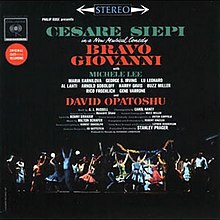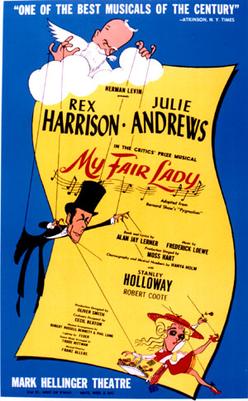
My Fair Lady is a musical with a book and lyrics by Alan Jay Lerner and music by Frederick Loewe. The story, based on the 1938 film adaptation of George Bernard Shaw's 1913 play Pygmalion, concerns Eliza Doolittle, a Cockney flower girl who takes speech lessons from professor Henry Higgins, a phonetician, so that she may pass as a lady. Despite his cynical nature and difficulty understanding women, Higgins grows attached to her.
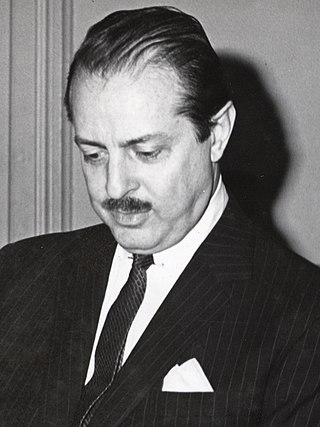
David Merrick was an American theatrical producer who won a number of Tony Awards.

Gypsy: A Musical Fable is a musical with music by Jule Styne, lyrics by Stephen Sondheim, and a book by Arthur Laurents. It is loosely based on the 1957 memoirs of striptease artist Gypsy Rose Lee, and focuses on her mother, Rose, whose name has become synonymous with "the ultimate show business mother." It follows the dreams and efforts of Rose to raise two daughters to perform onstage and casts an affectionate eye on the hardships of show business life. The character of Louise is based on Lee, and the character of June is based on Lee's sister, the actress June Havoc.

Timbuktu! is a musical, with lyrics by George Forrest and Robert Wright, set to music by Borodin, Forrest and Wright. The book is by Luther Davis. It is a resetting of Forrest and Wright's musical Kismet. The musical is set in 1361 in Timbuktu, in the Empire of Mali, West Africa.
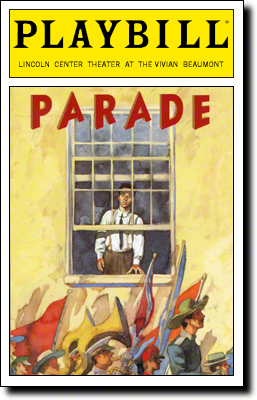
Parade is a musical with a book by Alfred Uhry and music and lyrics by Jason Robert Brown. The musical is a dramatization of the 1913 trial and imprisonment, and 1915 lynching, of Jewish American Leo Frank in Georgia.
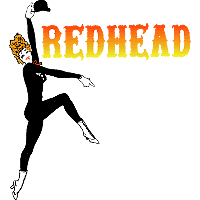
Redhead is a musical with music composed by Albert Hague and lyrics by Dorothy Fields, who with her brother, Herbert, along with Sidney Sheldon and David Shaw wrote the book/libretto. Set in London in the 1880s, around the time of Jack the Ripper, the musical is a murder mystery in the setting of a wax museum.

Cesare Siepi was an Italian opera singer, generally considered to have been one of the finest basses of the post-war period. His voice was characterised by a deep, warm timbre, a full, resonant, wide-ranging lower register with relaxed vibrato, and a ringing, vibrant upper register. Although renowned as a Verdian bass, his tall, striking presence and the elegance of phrasing made him a natural for the role of Don Giovanni. He can be seen in that role on Paul Czinner's 1954 film of the opera made during an edition of the Salzburg Festival under the baton of Wilhelm Furtwängler.

Gentlemen Prefer Blondes is a musical with a book by Joseph Fields and Anita Loos, lyrics by Leo Robin, and music by Jule Styne, based on the best-selling 1925 novel of the same name by Loos. The story involves an American woman's voyage to Paris to perform in a nightclub.

What's Up? is a musical notable as the first Broadway stage collaboration by Lerner and Loewe, with book by Arthur Pierson and Alan Jay Lerner, lyrics by Lerner, and music by Frederick Loewe.

Carmelina is a musical with a book by Joseph Stein and Alan Jay Lerner, lyrics by Lerner, and music by Burton Lane.
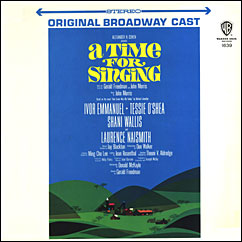
A Time for Singing is a musical with music by John Morris, lyrics by Gerald Freedman and John Morris, and a book by Freedman and Morris. The work was based on Richard Llewellyn's novel of a Welsh mining village, How Green Was My Valley. The show takes place in the memory of Protestant minister David Griffith, recalling conflict within the Morgan family over the possible formation of a miners' union within the village, and the romance between Griffith himself and Angharad of the Morgans, who ultimately marries the mine owner instead. The show starred Ivor Emmanuel, Tessie O'Shea, Shani Wallis and Laurence Naismith.
Milton Schafer was an American composer and pianist. After being a runner-up for first prize in the Texas-based national guild of piano teachers competition, Schafer continued his studies for a year in Paris with Nadia Boulanger. He returned to the U.S. to give his Town Hall début as a pianist in 1950, receiving very favorable reviews and performed there again in 1954.

Dolores Mae Wilson was an American coloratura soprano who had an active international opera career from the late 1940s through the early 1960s. Beginning her career with major theatres in Europe, she performed in six seasons at the Metropolitan Opera in New York City during the 1950s. She is perhaps best known for originating the title role in the world premiere of Douglas Moore's The Ballad of Baby Doe at the Central City Opera in 1956. After abandoning her opera career, she embarked on a second career as a musical theatre actress; making several appearances on Broadway in the following decades.

Leave It to Jane is a musical in two acts, with music by Jerome Kern and book and lyrics by Guy Bolton and P. G. Wodehouse, based on the 1904 play The College Widow, by George Ade. The story concerns the football rivalry between Atwater College and Bingham College, and satirizes college life in a Midwestern U.S. town. A star halfback, Billy, forsakes his father's alma mater, Bingham, to play at Atwater, to be near the seductive Jane, the daughter of Atwater's president.

Shelley Vaughan Hull was an American stage actor who also appeared in two silent motion pictures. His Broadway popularity as a suave handsome leading man was continually on the rise until his early death at age 34 in the Influenza pandemic of 1918.

Willie Howard and Eugene Howard, billed as the Howard Brothers, were Silesian-born American vaudeville performers of the first half of the 20th century. They were two of the earliest openly Jewish performers on the American stage.

Little Jessie James was a musical farce that was the biggest hit of the 1923-24 Broadway season.

The Crinoline Girl is a 1914 musical comedy written by Julian Eltinge, Otto Hauerbach, and Percy Wenrich. Producer Al Woods staged it on Broadway.

Tangerine is a musical with music by Monte Carlo and Alma M. Sanders, lyrics by Howard Johnston, about three men jailed for not paying alimony, written by Philip Bartholomae and Guy Bolton.

Along Fifth Avenue is a revue in two acts with sketches by Charles Sherman and Nat Hiken; music by Gordon Jenkins, Richard Stutz, Milton Pascal and Hiken; and lyrics by Tom Adair, Stutz, Pascal and Hiken. It was produced on Broadway in 1949.
